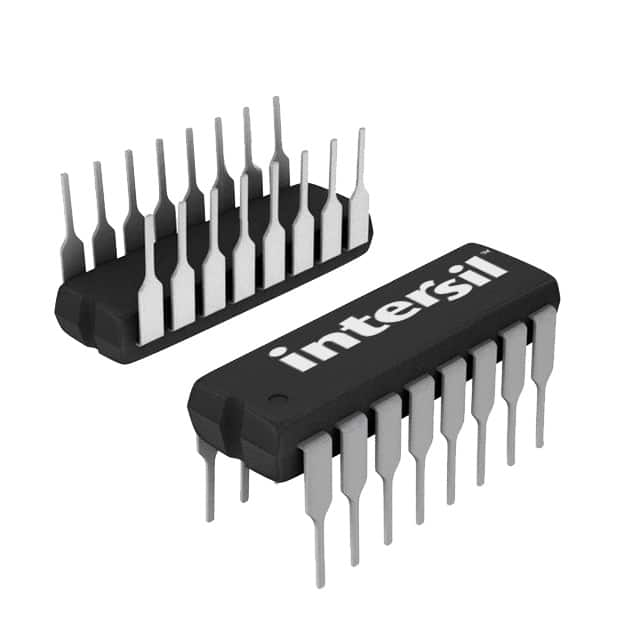HI1-0508-2
Product Overview
Category
HI1-0508-2 belongs to the category of electronic components.
Use
It is primarily used in electronic circuits for signal processing and amplification.
Characteristics
- Small size
- High performance
- Low power consumption
- Wide operating voltage range
Package
HI1-0508-2 comes in a compact package, suitable for surface mount technology (SMT) applications.
Essence
The essence of HI1-0508-2 lies in its ability to provide reliable signal processing and amplification in various electronic devices.
Packaging/Quantity
Each package of HI1-0508-2 contains 100 units.
Specifications
- Operating Voltage: 3.3V - 5V
- Input Impedance: 10kΩ
- Output Impedance: 100Ω
- Gain Bandwidth Product: 100 MHz
- Maximum Power Dissipation: 500 mW
- Operating Temperature Range: -40°C to +85°C
Detailed Pin Configuration
HI1-0508-2 has a total of 8 pins arranged as follows:
- VCC: Power supply input
- GND: Ground reference
- IN+: Non-inverting input
- IN-: Inverting input
- OUT: Amplified output
- NC: No connection
- NC: No connection
- NC: No connection
Functional Features
- High gain amplification
- Low distortion
- Wide bandwidth
- Stable operation under varying conditions
- Built-in protection against overvoltage and short circuits
Advantages
- Compact size allows for space-saving designs
- Low power consumption increases energy efficiency
- Wide operating voltage range provides flexibility in different applications
- High performance ensures accurate signal processing and amplification
Disadvantages
- Limited pin configuration options
- May require additional external components for specific applications
- Sensitive to electrostatic discharge (ESD) and proper handling is necessary
Working Principles
HI1-0508-2 operates based on the principles of operational amplifiers. It amplifies the input signal using a differential amplifier configuration and provides an amplified output signal with high gain and low distortion.
Detailed Application Field Plans
HI1-0508-2 finds applications in various fields, including: - Audio amplification circuits - Sensor signal conditioning - Communication systems - Medical devices - Industrial automation
Detailed and Complete Alternative Models
Some alternative models that can be considered as alternatives to HI1-0508-2 are: - OP-AMP1 - AMP-2000 - IC-100A - OPV-500
These models offer similar functionality and characteristics, providing options for different design requirements.
In conclusion, HI1-0508-2 is a compact and high-performance electronic component used for signal processing and amplification. Its wide operating voltage range, low power consumption, and small size make it suitable for various applications. However, it has some limitations in terms of pin configuration and sensitivity to ESD. Alternative models are available to cater to different design needs.
Senaraikan 10 soalan dan jawapan biasa yang berkaitan dengan aplikasi HI1-0508-2 dalam penyelesaian teknikal
Sure! Here are 10 common questions and answers related to the application of HI1-0508-2 in technical solutions:
1. What is HI1-0508-2? HI1-0508-2 is a specific model or component used in technical solutions, typically referring to a hardware device or software module.
2. What are the main features of HI1-0508-2? The main features of HI1-0508-2 may vary depending on the specific product, but generally, it could include high-speed data transfer, compatibility with various protocols, low power consumption, and compact size.
3. How can HI1-0508-2 be integrated into a technical solution? HI1-0508-2 can be integrated into a technical solution by connecting it to the relevant system or network using appropriate interfaces and protocols. This may involve physical connections, configuration settings, and software integration.
4. What are some typical applications of HI1-0508-2? HI1-0508-2 can be used in various technical solutions such as industrial automation, robotics, IoT devices, communication systems, medical equipment, and automotive electronics.
5. Is HI1-0508-2 compatible with different operating systems? Compatibility with operating systems depends on the specific product and its drivers or software support. It's important to check the manufacturer's documentation for compatibility information.
6. Can HI1-0508-2 handle high data volumes? Yes, HI1-0508-2 is designed to handle high data volumes efficiently, ensuring smooth data transmission and processing.
7. Does HI1-0508-2 support real-time communication? Some versions of HI1-0508-2 may support real-time communication protocols, enabling fast and reliable data exchange in time-critical applications.
8. What are the power requirements for HI1-0508-2? The power requirements for HI1-0508-2 can vary, but it typically operates on low voltage and consumes minimal power. The specific power specifications should be provided by the manufacturer.
9. Can HI1-0508-2 be used in harsh environments? Certain versions of HI1-0508-2 are designed to withstand harsh environmental conditions such as extreme temperatures, humidity, and vibrations. It's important to select the appropriate variant based on the intended application.
10. Are there any limitations or considerations when using HI1-0508-2? While HI1-0508-2 offers many benefits, it's essential to consider factors like compatibility with other system components, software support, and potential limitations in terms of data transfer rates, distance, or specific use cases. Consulting the product documentation and seeking expert advice is recommended to ensure optimal integration and performance.


